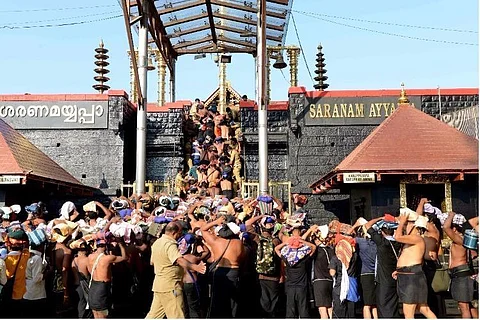

Stating that the shutting down of Sabarimala temple for "purification ritual" after the entry of two women violated SC verdict, contempt action has been sought against the Chief Priest of the temple. The petition was mentioned before the Supreme Court on Thursday.
However, the CJI turned down the request for urgent consideration of the matter. "We cannot constitute separate bench for contempt petition", the CJI remarked in response to the oral mentioning.
On January 22, the SC is set to hear in open court the review petitions filed against the September 28 verdict in the Indian Young Lawyers Association case, which declared right of women of all age groups to enter the temple.
Two women, Bindu & Kanakadurga, both aged below 50 years, had visited the temple and offered prayers yesterday early morning around 3.30 AM. After that, the Chief Priest Kandararu Rajeevaru shut down the temple around 10.30 AM for "purification" rituals, on the ground that women entry had resulted in the defiling of the deity.
The contempt petition was originally filed by one Varsha on November 16, against the Chief Priest and P Ramavarma Raja, representative of the erstwhile Pandalam royal family. The petition alleged that the conduct of Ramavarma in writing a letter to the Chief Priest urging him to close the temple in the event of women entry amounted to "scandalising and lowering the authority of the Court".
Initially, a petition seeking the sanction of Attorney General for initiating criminal contempt was filed. The AG withdrew himself from considering the matter. Later, the matter was considered by Solicitor General Tushar Mehta, who declined sanction. After that, the petition was filed in the Supreme Court under Article 129 of the Constitution of India.
Today, the petitioner's counsel brought to the Court's attention to Wednesday’s events and requested for early listing of the petition.
It was held by Justice Chandrachud in the September 28 judgment that exclusion of women on the ground of menstrual impurity was a form of untouchability. “To use the ideology of "purity and pollution" is a violation of the constitutional right against "untouchability", Justice Chandrachud had observed in the judgment.
This was first published on Livelaw here and has been republished with permission.